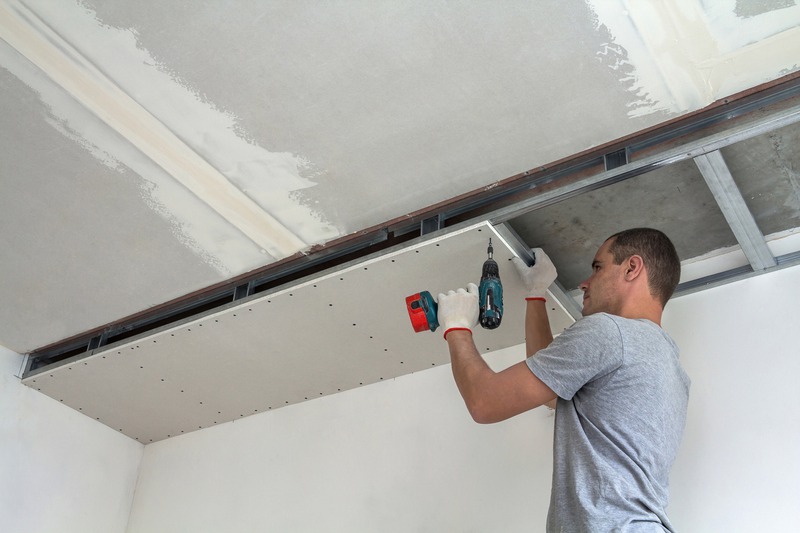
Why Are Ceiling Panels Crucial for Office Acoustics?
Imagine entering an office space that reverberates with every footstep, where every conversation echoes, and concentration becomes a battle against background noise. It’s not the most productive or enjoyable environment. That’s where ceiling panels come into play.
They are the unsung heroes of office acoustics, often overlooked yet essential for creating a functional and comfortable workspace.
The Role of Acoustics in Office Design
Before we delve into the importance of ceiling panels, let’s take a moment to understand the role acoustics play in office design. Acoustics refers to the way sound travels within a space. Good office acoustics can enhance privacy, improve focus, and even well-being.
In contrast, poor acoustics can lead to increased stress, reduced productivity, and general discontent among employees. This explains the growing emphasis on incorporating sound management strategies in office interiors.
Acoustical Ceiling Manufacturer
When it comes to acoustic control, choosing the proper ceiling panel manufacturer is crucial. A prominent name in the industry is Rockfon, known for its commitment to improving sound absorption and bringing style and sustainability to its products.
They craft ceiling solutions that meet the aesthetic requirements of modern offices while addressing acoustic challenges. Good acoustical manufacturers don’t just sell products; they provide solutions that contribute significantly to the overall auditory experience of a workspace.
The Science Behind Sound Absorption
So why do we need ceiling panels for office acoustics? The answer lies in the science of sound. Sound waves travel through the air and, upon encountering surfaces, can be reflected, absorbed, or diffused. Hard, flat surfaces, like most ceilings, typically reflect sound, leading to echoes and increased noise levels. Sound-absorbing ceiling panels are designed to capture and convert these sound waves into tiny amounts of heat, effectively reducing reverberation and minimizing overall noise.
Improving Speech Intelligibility
Clear communication is the backbone of any successful business. In an office setting, employees need to understand each other without straining. Ceiling panels play a pivotal role in this aspect:
-
They reduce the background noise that can drown out speech.
-
They help contain sound in individual areas, thus limiting disruption.
-
The panels prevent sound from traveling across the office, allowing for more discrete conversations.
Addressing Different Acoustic Needs
No two offices are the same, and neither are their acoustic needs. Depending on the layout, size, and function of a space, the requirement for acoustic control can vary. For instance, a bustling sales floor might need more robust sound management, while a creative studio may require a balanced environment that fosters collaborative discussions without overwhelming echo. Ceiling panels can be selected and installed to meet these specific needs, making them incredibly versatile in office design.
Industrial Ceilings
In industrial settings, where the scale and purposes of the spaces vary vastly from typical office environments, the choice of ceiling tiles is pivotal. Retail ceiling tiles are designed to endure harsh conditions and improve the acoustic quality in spaces where cleanliness and durability are also key concerns. These tiles lend themselves well to areas with heavy machinery, large crowds, or environments that require frequent maintenance and cleaning.
Enhancing Aesthetics and Office Ambiance
Beyond acoustics, ceiling panels contribute to an office’s overall look and feel. They come in a variety of materials, colors, and designs that can:
-
Add visual interest to the office ceiling landscape.
-
Complement or contrast the interior design theme.
-
Help delineate different zones within an open-plan office.
-
Improve the lighting by enhancing light reflection or absorption as needed.
Ceiling Tiles and Panels
When discussing office acoustics, we must recognize the importance of the actual ceiling tiles and panels. Acoustic ceiling tiles are a popular and practical choice for reducing noise levels in office environments.
They are engineered to trap sound waves and prevent them from bouncing back into the room, making them indispensable in creating a serene office atmosphere. Moreover, these tiles are often accessible to install and maintain, adding to their appeal for office use.
Health, Well-being, and Productivity
It’s well-established that a comfortable working environment influences health, well-being, and productivity. Ceiling panels contribute to this by:
-
Reducing stress caused by excessive noise.
-
Creating a quieter workspace that can lower blood pressure and heart rate.
-
Allowing for better concentration by minimizing distractions.
-
Making a space more inviting and comfortable to spend time in.
Whisper Quiet
In pursuit of the whisper-quiet office, ceiling panels are not a luxury but a necessity. Employees value a workspace where they can think and collaborate without the constant intrusion of unwelcome noise.
By absorbing sound, these panels facilitate an environment where the only interruption is the flow of ideas. We’ve all experienced the irritation of a noisy office, and it’s not where we are at our best.
Final Thoughts
In closing, it’s clear that the importance of ceiling panels in office acoustics cannot be overstated. They are integral to creating an office ambiance conducive to productivity and employee satisfaction. We often take the quiet provided by these panels for granted, but our offices would be far more comfortable with them. Whether you’re building a new office or refurbishing an old one, considering the acoustic properties of your ceiling solutions will ensure that your workspace is as functional and pleasant as possible.
Remember, when it comes to office acoustics, it’s not just about blocking out noise; it’s about creating an acoustic environment that enhances how we work and interact. By investing in quality ceiling panels, we take a significant step towards achieving that goal. After all, the sound of success in the workplace isn’t just about what we hear; it’s about what we don’t.
